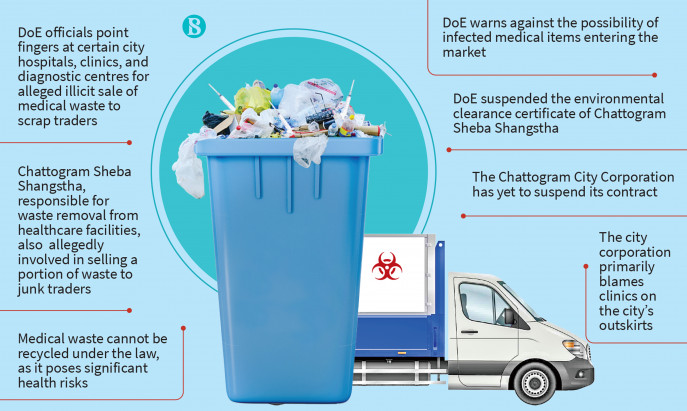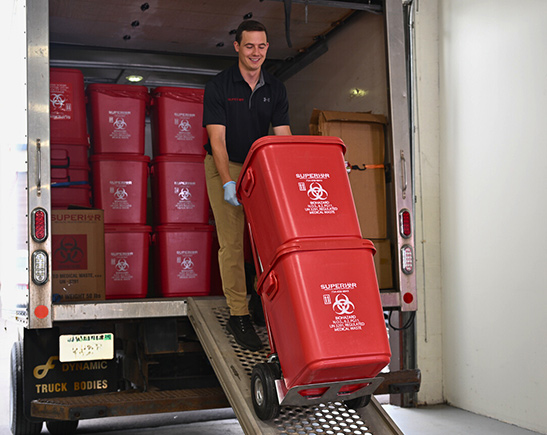Safeguarding Wellness: Expert Medical Waste Removal Services for a Clean Atmosphere
Safeguarding Wellness: Expert Medical Waste Removal Services for a Clean Atmosphere
Blog Article
Stay Ahead of Regulations: Professional Recommendations on Medical Garbage Disposal
In a world where the healthcare market is regularly advancing, it is important for medical centers to remain in advance of laws when it involves the proper disposal of medical waste. With stringent guidelines and frequent regulatory changes, it can be challenging to navigate the complexities of this process. With professional guidance, centers can make sure compliance and reduce risks associated with improper waste disposal. From comprehending the various groups of clinical waste to carrying out the ideal collection and segregation techniques, this conversation will certainly offer actionable suggestions and valuable understandings to assist facilities remain in advance of policies in the ever-changing landscape of medical garbage disposal.
Comprehending Clinical Waste Categories
Understanding clinical waste categories is necessary for proper disposal and monitoring in healthcare centers. Clinical waste refers to any kind of waste generated by health care activities that might pose a danger to public health or the atmosphere. It is critical to categorize clinical waste properly to ensure its risk-free handling, therapy, transportation, and disposal.
There are numerous groups of clinical waste that healthcare facilities need to be acquainted with. One of the most common categories include transmittable waste, pathological waste, sharps waste, pharmaceutical waste, and chemical waste. Each group has specific guidelines and policies for its appropriate monitoring and disposal.
Transmittable waste includes materials polluted with blood or various other physical liquids, such as handwear covers, dress, and laboratory cultures. Pathological waste refers to human tissues, organs, or body parts that need unique handling and disposal. Sharps waste consists of made use of needles, syringes, and various other sharp things that can create injury and send infections. Drug waste comprises expired, unused, or contaminated drugs that need careful handling and disposal. Lastly, chemical waste includes solvents, disinfectants, and other chemical substances made use of in medical care centers.
Staying Up-To-Date With Regulatory Changes
Remaining present with regulative changes is important for health care facilities to guarantee compliance and proper management of clinical garbage disposal. medical waste removal. With laws frequently progressing, it is vital for healthcare centers to stay up-to-date to stay clear of charges, fines, and possible damage to the environment and public health and wellness
To stay ahead of governing modifications, healthcare centers ought to develop a system for tracking and tracking updates. This can be done by signing up for regulatory e-newsletters, going to meetings and workshops, and actively joining industry organizations. Additionally, centers should mark an employee or team in charge of staying notified and disseminating info to pertinent stakeholders.
Routine interaction with regulatory companies is additionally essential. Medical care facilities need to establish connections with neighborhood, state, and federal companies to guarantee they understand any kind of changes in policies that might impact their waste administration methods. This can be done via regular conferences, engagement in public comment periods, and positive involvement with regulatory agencies.
Additionally, medical care facilities need to think about partnering with waste management business that concentrate on medical garbage disposal (medical waste disposal services with WasteX). These firms are frequently skilled in the most recent regulations and can offer support and assistance to make certain conformity
Implementing Proper Collection and Segregation Methods
To efficiently handle medical waste disposal, health care facilities should establish appropriate collection and segregation methods based on regulatory guidelines. Implementing these techniques ensures the risk-free handling and disposal of potentially hazardous materials, protects the environment, and minimizes the threat of injuries and infections to medical care employees and the basic public.
Appropriate collection and segregation methods involve making use of marked containers and identifying systems. Health care facilities should give plainly identified containers for different kinds of clinical waste, such as sharps, contagious waste, pharmaceutical waste, and non-hazardous waste. These containers ought to be color-coded and clearly significant to prevent confusion and advertise simple identification.
Additionally, medical care facilities should educate their personnel on the appropriate treatments for gathering and segregating clinical waste. This includes educating them on the various kinds of waste, the ideal containers to utilize, and the significance of following laws and guidelines. Regular training sessions and refresher course courses need to be carried out to guarantee that team member continue to be updated on ideal methods.
Furthermore, medical care facilities ought to establish a system for normal collection and disposal of medical waste. This might involve partnering with accredited waste management business that concentrate on medical garbage disposal. These companies will certainly ensure that the gathered waste is transported and taken care of in compliance with this regulative needs.
Choosing the Right Disposal Techniques

Incineration is just one of one of the most usual and reliable methods for getting rid of specific kinds of clinical waste, such as pathological waste and sharps. It includes the regulated combustion of waste at heats, minimizing it to ash. Nonetheless, incineration can launch dangerous toxins right into the air and add to air pollution.

Chemical therapy includes the usage of chemicals to decontaminate and counteract the waste. Microwave treatment uses microwave energy to heat and disinfect the waste.
Guaranteeing Compliance Through Paperwork and Training
After very carefully thinking about the proper disposal techniques for clinical waste, health care facilities should guarantee compliance with regulations and minimize environmental impact by implementing effective documents and training treatments. This action is vital in preserving a risk-free and sustainable setting for both health care workers and the general medical waste disposal services with WasteX public.

Training is equally crucial in making certain compliance with policies. Medical care employees who deal with clinical waste needs to obtain appropriate training on waste segregation, managing, and disposal treatments. This training should cover topics such as the proper use individual safety tools, recognition of different kinds of waste, and the appropriate disposal techniques for every waste group. By giving comprehensive training, healthcare facilities can empower their staff to make informed decisions and reduce the danger of incorrect waste disposal.
Verdict
To conclude, remaining ahead of policies in clinical garbage disposal is critical for medical care facilities. medical waste removal services. Comprehending the different categories of clinical waste, staying updated with governing modifications, executing proper collection and partition techniques, choosing the appropriate disposal approaches, and making sure compliance via paperwork and training are all important steps. By following these standards, health care companies can properly handle and dispose of clinical waste in a risk-free and responsible fashion
From comprehending the different classifications of medical waste to applying the best collection and partition techniques, this discussion will give useful insights and workable tips to help centers stay ahead of laws in the ever-changing landscape of medical waste disposal. - medical waste disposal services with WasteX
The most usual categories include infectious waste, pathological waste, sharps waste, pharmaceutical waste, and chemical waste. Health care facilities must supply plainly classified containers for various kinds of clinical waste, such as sharps, transmittable waste, pharmaceutical waste, and non-hazardous waste. Healthcare facilities should establish an extensive system to tape-record and track all elements of medical waste disposal, including types medical waste disposal services with WasteX of waste generated, quantities, and disposal methods used. Healthcare employees that take care of clinical waste must get proper training on waste partition, managing, and disposal procedures.
Report this page